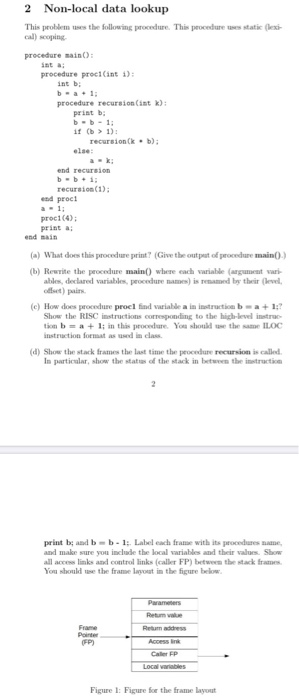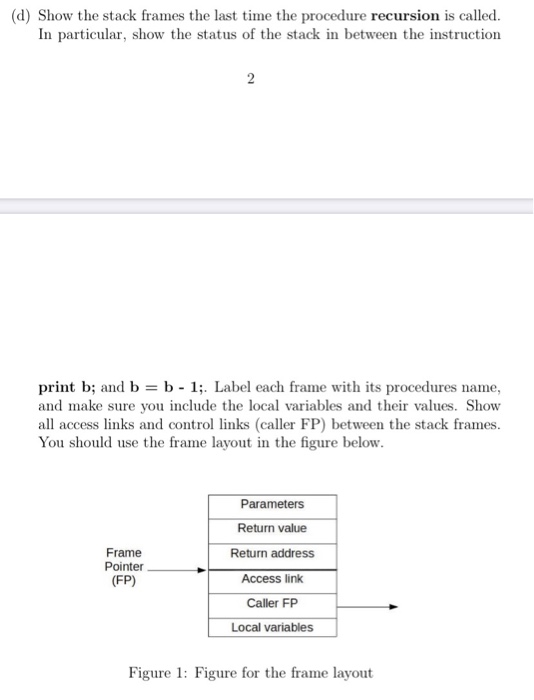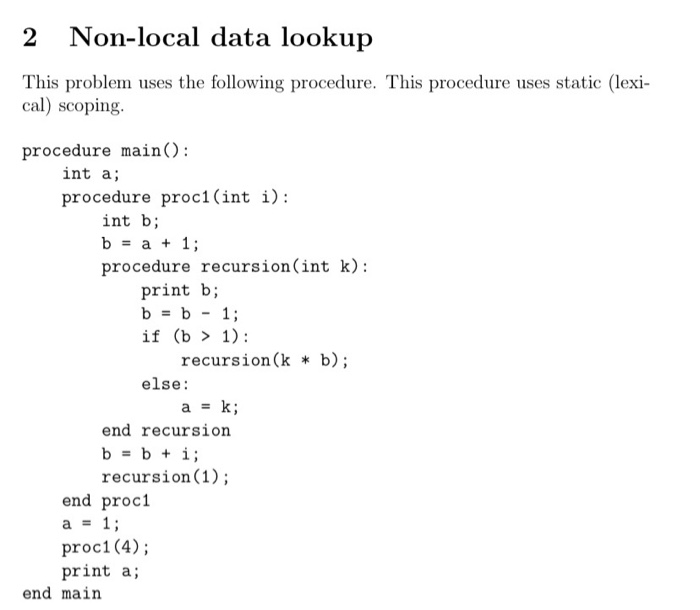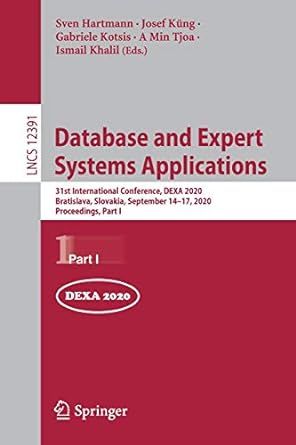please answer the question dthank you very much

2 Non-local data lookup This problem is the following procedure. This procedure cal) wong state flexi procedure sain(); Sata procedure procint 1): int bi procedure recursion (int k): print b; bb-1; 11 ( 1): recursionk.b): end recursion recursion (1): end proci proc1(4): print a; end main (a) What does this procedure print' (Give the output of procedure main()) (b) Rewrite the procedure main() where each variable argument war ables declared variables, procedure name) is reed by their level oft) puis (c) How does procedure procl find variable a in instruction b a +1:? Show the RISC instructions corresponding to the high-level inste tion b=a + 1; in this procure You should the ILOC instruction format din class (d) Show the stack frames the last time the procedure recursion is called In particular, show the state of the stack in the instruction print b; and b b -1. Label each frame with its procedures ne and make sure you include the local variables and their values. Show all acces links and control links (caller FP) between the stack fra You should the frame lot in the figure below Retum value Returns FP Figure 1: Figure for the frame Layout (d) Show the stack frames the last time the procedure recursion is called. In particular, show the status of the stack in between the instruction print b; and b = b - 1;. Label each frame with its procedures name, and make sure you include the local variables and their values. Show all access links and control links (caller FP) between the stack frames. You should use the frame layout in the figure below. Parameters Return value Return address Frame Pointer (FP) Access link Caller FP Local variables Figure 1: Figure for the frame layout 2 Non-local data lookup This problem uses the following procedure. This procedure uses static (lexi- cal) scoping procedure main(): int a; procedure proci(int i): int b; b = a + 1; procedure recursion(int k): print b; b = b - 1; if (b > 1): recursion(k * b); else: a = k; end recursion b = b + i; recursion(1); end proci a = 1; proc1(4); print a; end main 2 Non-local data lookup This problem is the following procedure. This procedure cal) wong state flexi procedure sain(); Sata procedure procint 1): int bi procedure recursion (int k): print b; bb-1; 11 ( 1): recursionk.b): end recursion recursion (1): end proci proc1(4): print a; end main (a) What does this procedure print' (Give the output of procedure main()) (b) Rewrite the procedure main() where each variable argument war ables declared variables, procedure name) is reed by their level oft) puis (c) How does procedure procl find variable a in instruction b a +1:? Show the RISC instructions corresponding to the high-level inste tion b=a + 1; in this procure You should the ILOC instruction format din class (d) Show the stack frames the last time the procedure recursion is called In particular, show the state of the stack in the instruction print b; and b b -1. Label each frame with its procedures ne and make sure you include the local variables and their values. Show all acces links and control links (caller FP) between the stack fra You should the frame lot in the figure below Retum value Returns FP Figure 1: Figure for the frame Layout (d) Show the stack frames the last time the procedure recursion is called. In particular, show the status of the stack in between the instruction print b; and b = b - 1;. Label each frame with its procedures name, and make sure you include the local variables and their values. Show all access links and control links (caller FP) between the stack frames. You should use the frame layout in the figure below. Parameters Return value Return address Frame Pointer (FP) Access link Caller FP Local variables Figure 1: Figure for the frame layout 2 Non-local data lookup This problem uses the following procedure. This procedure uses static (lexi- cal) scoping procedure main(): int a; procedure proci(int i): int b; b = a + 1; procedure recursion(int k): print b; b = b - 1; if (b > 1): recursion(k * b); else: a = k; end recursion b = b + i; recursion(1); end proci a = 1; proc1(4); print a; end main










